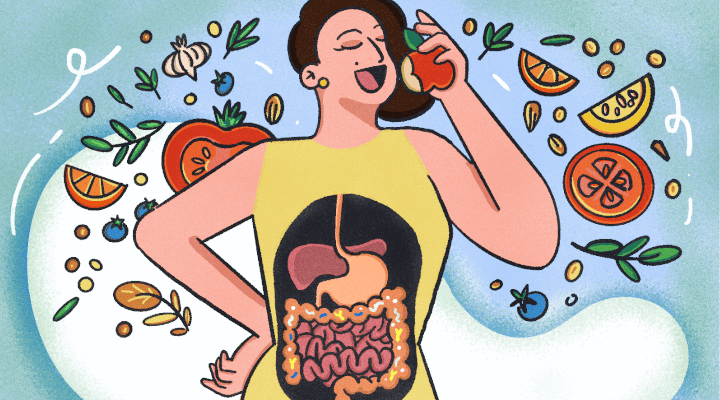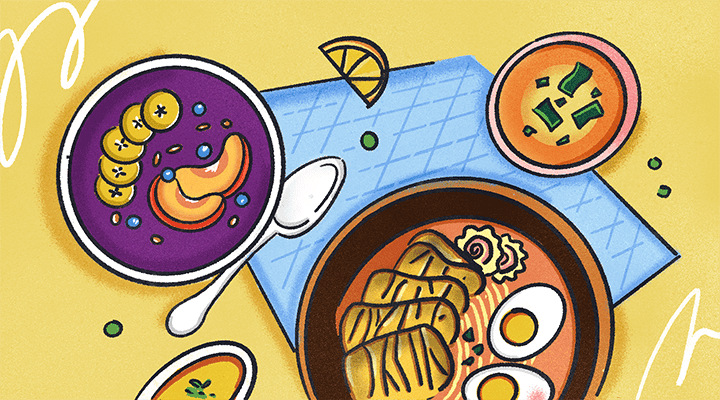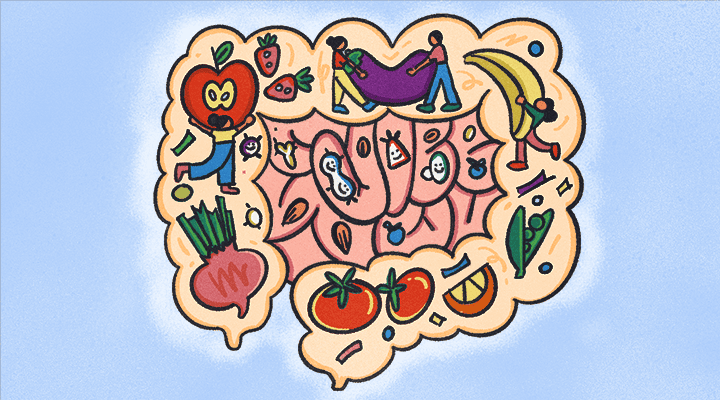Eat Well, Your Gut Will Thank You For It

You have probably heard of the famous adage: “Trust your gut”. But going with our gut isn’t just about heeding our instincts. From our skin to our brain, the health of our gut can have far-reaching effects on our well-being.
It may be hard to imagine, but at this moment, trillions of bacteria, fungi, and viruses are working hard inside our bodies to keep us in tip-top shape. They are a part of our gut microbiome, which breaks down food, absorbs nutrients, and boosts immunity.
An imbalance in our microbiome can trigger an upset stomach, bloating, or diarrhoea, for instance. In the long term, serious issues can emerge. Local researchers have found that some harmful gut organisms in our microbiome can be linked to gastrointestinal diseases like colon cancer. In addition, other chronic conditions like irritable bowel syndrome (IBS), type 2 diabetes, and even eczema can also occur.
The gut is also where a whopping 95% of serotonin (aka the “happiness chemical”) are created. Serotonin levels are low when we feel depressed or anxious. Therefore, regulating our gut microbiome can enhance our overall mood.
What’s Health “Gut” To Do With It?
There are several ways to discern if your gut is in good shape. Besides taking a microbiome test (yes, from your poo!), acquaint yourself with some common tell-tale signs:
- Funky feelings: frequent stomach discomfort, gas, bloating, pain, or diarrhoea.
- Peculiar poo: anything that deviates from smooth, brown and firm.
- Subtler signs: Constant fatigue, unexplained weight changes, skin issues and food sensitivities.
The bottomline is, if something feels off, “trust your gut” and consult your doctor.
Eating Your Way to a Healthy Gut
To improve our gut health, we should incorporate more probiotics and prebiotics in our diet. Probiotics contain live microorganisms that help to maintain the community of good bacteria in the gut.
If the thought of adding probiotics into your diet is too daunting, don’t worry. Probiotics can also be found in many food sources. An example is fermented foods, as probiotics like yeast and live bacteria are present from the fermentation process.

Probiotic-rich Food To Try:
-
Kimchi
This popular Korean dish is readily available on store shelves, but you can also try making your own. It can easily be incorporated into many dishes or eaten on its own as a side dish. If you are short on time, try this kimchi pancake recipe made from frozen prata and kimchi.
-
Miso
You might have heard of miso from miso soup, but miso can also be used as a sauce base for udon and even pasta. Miso is a fermented paste that is traditionally made from soybeans. It is nutrient-rich, containing manganese, vitamin K, zinc, and is packed with probiotics. Just watch your salt intake as miso is very salty.
-
Kefir
The thought of fermented milk might trigger old memories of accidentally tasting spoilt milk. But kefir, a fermented milk drink, is far from that. It has a sweet and tangy taste, and is packed with calcium and probiotics. You can even use kefir to make pancakes and smoothies.
-
Supplements
If you are looking for a more straightforward route to fulfil your probiotic intake, consider probiotic supplements. These can come in pill or liquid form. To be certain, check with your doctor before starting any supplements.
But probiotics need “food” to work well. That’s where prebiotics come in. Prebiotics are specialised plant fibres that can boost the growth of probiotics. Both work in tandem to ensure that our gut is functioning optimally.
Prebiotics can naturally be found in common fruits and vegetables such as bananas, apples, tomatoes, and garlic. Legumes, which include beans, peas, and lentils, are another rich source. If you love bread, try switching out processed white bread for sourdough, which is rich in fibre.

Other Tips and Tricks
Try to avoid foods that trigger imbalances within your gut microbiome. These include refined sugar, alcohol, processed food, dairy, and fried food.
Apart from making small changes to your diet, find ways to release stress, sleep well, drink enough water, and simply chew longer. Doing so will put your gut in an ideal state to sustain you.
You’ve “Gut” This!
Our gut microbiome is just like a garden full of different plants. For the plants to flourish, it is necessary to provide them with the right conditions and nourish them with the best fertilisers. So for (your) gut’s sake, don’t let your gut down!
- POSTED ON
Apr 5, 2023
- TEXT BY
Erin Liam
- ILLUSTRATION BY
Liew Xinyi









